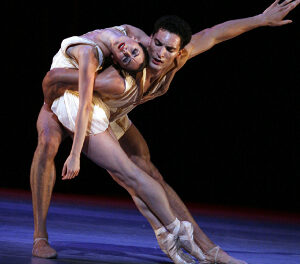The North Carolina Master Chorale (some 200 voices), under the outstanding leadership of maestro Alfred E. Sturgis, shared the stage at Meymandi Concert Hall with the Wake County High School Honors Chorus (around 120 voices). It was a rare and stirring experience to hear such a choir which could overpower the orchestra. Often, it is the other way around. Nineteen high school choruses provided their most talented students, tutored them and saw that they got to the previous four Tuesday night rehearsals with the Master Chorale where the tough task master drilled them into shape. Just kidding folks. Rehearsals with Sturgis are the highlight of the week for many singers and the results show in the performances of groups he leads.
Case in point: the concert opened with two selections by the high school group, a Bach motet and a spiritual. The motet, “Der Gerechte kommt um” (“See, the righteous must die”), is a typical Lutheran text addressing death as release from life’s woes to a better place. It was probably composed as an unaccompanied motet by Johann Kuhnau. Bach (possibly) arranged it for five-voice choir and continuo featuring flutes, oboes, violins, and viola. Telemann also tinkered with this piece. The performance by the high school Honors Chorus was superb and well balanced through all parts; it was sung sensitively and was movingly effective. The spiritual “Ain’a That Good News,” in William Dawson’s arrangement, was sung unaccompanied with precision and plenty of energy.
When Dvořák arrived in New York in 1892, beginning his momentous and creative years in the New World, he brought with him as his calling card his setting of the ancient hymn of praise, Te Deum. It had been suggested by Jeanette Thurber, under whose auspices his stay was arranged, that he prepare a new choral work to be presented at his first American concert. Thus it was introduced to the world at a gala Carnegie Hall concert on December 21, 1892. Although the text of Te Deum falls naturally into three parts; the symphonic-minded Dvořák set it in four movements, splitting the prayers of supplication into two parts. It begins with a tympani fanfare and exultant strings with the chorus entering with the words, “Te Deum laudamus” (“We praise you, God”). With both the Master Chorale and the Wake County High School Honors Chorus singing together, it was a powerful and glorious pronouncement of praise. As the choir faded to a hushed statement of the “Sanctus,” the solo soprano, Katherine Anderson, picked up the hymn of praise. After a reprise of the opening melody, the second movement began with a brass fanfare and the words “Tu Rex Gloriae” (“You are the King of glory”), mostly a baritone solo sung by David Mellnik with a rather oriental-sounding accompaniment and lovely interjections from the chorus. The third movement, a scherzo, virtually dances the text “Aeterna fac cum Sanctus tuis” a plea to be numbered with the Saints in glory. The soprano soloist begins the finale movement “Dignare, Domine,” a continuation of the prayer for mercy and concluding with a final verse of praise and jubilation, closing with the orchestra’s triumphal climax. The orchestral ensemble and the very large combined chorus, along with the fine soloists, rendered a stirring performance of this gem by a favorite composer of the romantic era.
The second half of the program featured the North Carolina premiere of The Here and Now by Christopher Theofanidis. The work is a collection of thirteen short movements based on the mystical and transcendent poetry of the Persian Sufi teacher and mystic philosopher Jelaluddin Rumi. It was commissioned by Robert Spano and the Atlanta Symphony Orchestra and was first performed by them in May, 2005. The work was recorded for the Telarc label and received the 2007 Grammy award for Best New Composition. On this occasion the work was performed by the Master Chorale with augmented orchestra and soloists Anderson, Mellnick and tenor Daniel Hinson.
The thirteen movements consist of a variety of Rumi’s poetry in English translations by Coleman Barks published in The Essential Rumi. They range from deeply contemplative mysticism to humorous folk sayings. The humorous verses (subtitled narratives) were sung by the soloists. Space will permit only a sampling of the text – verse V “The value of our souls” (narrative 1)
There was once a man
who inherited a lot of money and land.
But he squandered it all too quickly. Those who inherit
wealth don’t know what work it took to get it.
In the same way, we don’t know the value of our souls,
which were given to us for nothing.
The music was composed using a variety of inventive harmonic, rhythmic, and scoring devices to support and project the meaning of the poems, and hearing this work was a fascinating and moving experience. The orchestra, chorus, and soloists performed as skilled interpretive artists bringing to life the provocative and moving reflections of a unique soul from eight hundred years ago to stir and challenge our souls.
All the forces, including the high school singers, joined together once more for a rousing performance of “Hallelujah” from Beethoven’s oratorio Christus am Oelberg (Christ on the Mount of Olives). It was a fitting glorious conclusion to an exciting and fulfilling concert. Praise is due to all involved in this event including special recognition of the high school ladies and gentlemen and their excellent choral instructors who help make the music makers and music lovers of the future.











